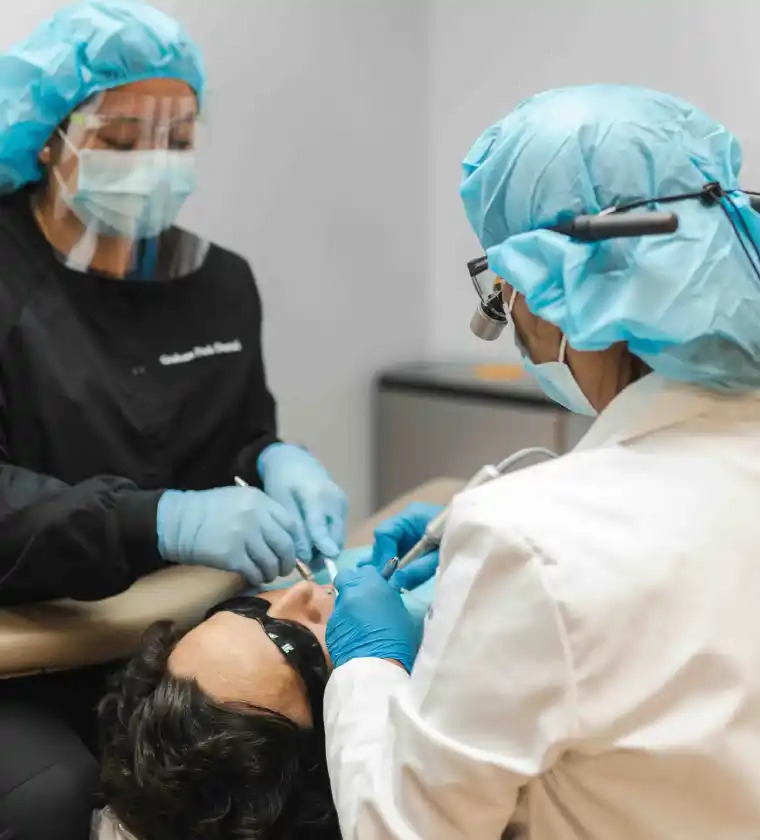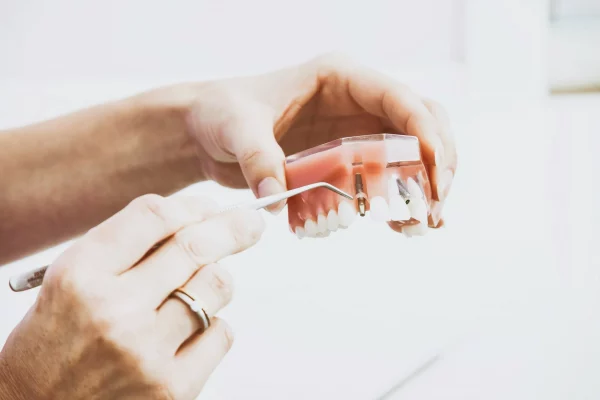Dental implants have become the gold standard in tooth replacement, offering both durability and a natural look but finding the right provider close to home can make all the difference in your experience and results. Typing “dental implants near me” isn’t just a casual search it reflects a decision rooted in urgency, trust, and the need for accessible care.
In this blog, we’ll break down what this search really means, what to look for in a nearby clinic, how to compare prices without sacrificing quality, and which treatment options (like All-on-4) are commonly offered by local implant specialists.
Why “Dental Implants Near Me” Is a High-Intent Search
When individuals enter the query “dental implants near me” into a search engine, their intent is typically quite clear, they are actively seeking specific dental services in their vicinity. This constitutes a high-intent search, signifying that these users have likely already evaluated their options and are now prepared to identify a local provider to initiate treatment. Such users are generally seeking immediate access to essential information such as cost, practitioner expertise, and appointment availability.
For dental practices, appearing prominently in these local search results is vital, as it positions the clinic to attract motivated patients who are prepared to proceed with a consultation or treatment. Failure to appear in these searches may result in missed opportunities to engage with individuals who are ready to make a decision.
Understanding Local SEO in Dental Marketing
When individuals search for “dental implants near me,” this typically signals an active intent to find a reputable, conveniently located dental provider. Clinics that consistently appear at the forefront of these local search results have generally implemented robust local SEO strategies. This often encompasses a verified Google Business Profile, a substantial number of positive local reviews, service pages tailored to specific locations, and a mobile-optimized website that is both responsive and informative.
These factors collectively enhance a clinic’s credibility and visibility within search engines. Still, it is crucial to recognize that a high Google ranking does not inherently guarantee the most suitable care. Prospective patients should take additional steps—such as reviewing the dentist’s credentials, assessing authentic patient feedback, and evaluating the clinic’s approach to personalized care—to ensure they select a provider who best aligns with their individual needs and expectations.
Why Patients Prefer Nearby Implant Clinics
Proximity extends beyond mere convenience, particularly when it comes to dental implants procedures, which typically unfold over multiple appointments across several months. The process begins with an initial consultation and advanced imaging, such as 3D scans, followed by the surgical placement of the implant itself. Subsequent follow-up visits are necessary to monitor healing and address any concerns, culminating in the final placement of the crown.
Selecting a provider located nearby can significantly reduce the physical and logistical burden of travel, especially after surgery or in the event of complications. Additionally, ongoing access to a familiar local dental team fosters continuity of care and a more comprehensive understanding of the patient’s dental history, ultimately enhancing the overall treatment experience.
How to Find the Best Dental Implants Near You

Start by searching for local providers with strong reputations—look for clinics with high ratings, verified reviews, and before-and-after photos of actual patients. Make sure the dentist specializes in dental implants and has advanced training or credentials in implantology. Schedule a consultation to ask about the materials used, the number of implants they’ve placed, and their success rate. A quality provider will offer a personalized treatment plan, explain the full process, and answer your questions clearly. Finally, consider convenience, payment options, and aftercare support to ensure you’re choosing a provider who meets both your clinical and personal needs.
Key Factors: Credentials, Reviews, Technology
Not every dental implants provider maintains the same degree of proficiency or employs comparable technology. When evaluating clinics, it is prudent to consider several key factors:
- Board-certified specialists in implant dentistry or periodontology, rather than general practitioners without advanced training.
- Utilization of advanced diagnostic and surgical technology, such as 3D CBCT imaging and guided surgical protocols.
- The presence of an in-house laboratory or milling facility to expedite case turnaround and quality control.
- Transparent before-and-after case galleries featuring actual patient outcomes.
- Authentic patient reviews on reputable platforms like Google, Healthgrades, or Zocdoc.
Patient testimonials can be particularly instructive, offering insights into the clinic’s approach to patient anxiety, clarity regarding pricing structures, and the responsiveness of postoperative care. Careful review of these elements may significantly inform the decision-making process for individuals considering dental implants treatment.
Questions to Ask Your Implant Dentist
- How many dental implants procedures have you performed?
- What’s your implant success rate?
- Do you offer guided implant surgery?
- Can I see real patient case studies or testimonials?
- What happens if there’s a complication?
A trustworthy provider should readily articulate their methodology, present tangible outcomes from previous work, and thoroughly discuss the available options with you, rather than skimming over essential details.
Affordable Dental Implants Near Me: What to Look For
When considering affordable dental implants in your area, it is crucial to look beyond the base price and assess overall value. Prospective patients should seek providers who practice transparency regarding costs, offering clear explanations of what is included and whether flexible payment plans are available. The use of high-quality materials and contemporary technology is essential; opting for lower-cost implants constructed from inferior materials may result in future complications. Evaluating the experience of the dental practitioner through patient reviews and documented clinical outcomes can provide insights into the likelihood of successful, lasting results.
Ultimately, the optimal approach is to strike a balance between affordability and professional expertise, ensuring both safety and long-term satisfaction.
Comparing Prices Without Compromising Quality
You don’t have to pay exorbitant prices for quality dental care, but, honestly, if a price seems suspiciously low, you should probably pause. Extremely cheap quotes often leave out crucial elements—think bone grafts, anesthesia, or even the final crown.
When you’re evaluating costs, don’t just accept the first number you hear. Insist on a detailed, itemized estimate. Ask whether the quote covers everything: consultation, scans, the actual surgical procedure, abutment, and the crown. If any of that’s missing, that “bargain” could turn into a headache.
Also, be wary of any practice that pressures you into making a quick decision or throws out huge discounts for “same-day” commitments. Trustworthy clinics typically provide flexible payment options, third-party financing (like CareCredit), or bundled pricing for multiple implants. Take your time and make sure you know exactly what you’re signing up for.
Cost of Full Mouth Dental Implants vs. Single Implant
A single dental implants, including the crown, typically costs between approximately $1,500 to $3,000 USD.
For patients requiring All-on-4 full arch implants, the price per arch ranges from $10,000 to $25,000 USD. While the initial expense for full arch solutions may appear substantial, these procedures often replace 10 to 14 teeth using only four implants. This approach can reduce the number of surgeries and overall treatment time, ultimately streamlining the process for patients requiring extensive dental restoration.
All-on-4 Dental Implants: A Popular Local Option
All-on-4 dental implants represent a significant advancement in restorative dentistry. Rather than requiring individual implants for each missing tooth, this approach uses four strategically positioned implants to support an entire upper or lower dental arch. The method is both time-efficient and generally more economical compared to traditional implant techniques. Due to its demonstrated high success rates, expedited recovery periods, and aesthetically pleasing outcomes, many dental practices now offer All-on-4 as a standard treatment option.
Particularly, it is well-suited for patients with compromised jawbone density or those seeking to avoid removable dentures. For individuals searching for a durable and stable resolution to tooth loss, the All-on-4 system presents a practical and transformative solution.
What Are All-on-4 Implants and Who Needs Them?
All-on-4 represents a comprehensive, fixed solution for full-arch dental restoration, utilizing only four strategically positioned implants to support an entire upper or lower set of teeth. Specifically, clinicians place two implants vertically at the front of the jaw and two angled implants toward the back, a method that frequently eliminates the need for bone grafting due to enhanced stability.
This treatment is particularly suitable for individuals who have lost multiple teeth or whose remaining teeth are failing, as well as for those currently dependent on removable dentures but seeking a more permanent, stable alternative. Even patients with moderate loss of jawbone volume are often considered viable candidates.
The All-on-4 technique is sometimes referred to as “teeth in a day,” reflecting its efficiency in providing patients with a functional and aesthetically pleasing set of teeth in a single procedure.
Cost of All-on-Four Dental Implants Near You
Dental implants procedures in local clinics typically cost between approximately $10,000 to $20,000 per arch. This fee generally encompasses digital diagnostics and planning, the surgical implantation process, provision of both temporary and permanent prosthetic teeth, as well as subsequent follow-up appointments.
It is advisable to consult your clinic regarding the materials used for prosthetic teeth. While some facilities may offer lab-made acrylic options, others provide zirconia, which is recognized for its superior durability but is associated with higher costs.
How to Evaluate the Cost of Dental Implants
Assessing the cost of dental implants isn’t as straightforward as simply comparing prices side by side. It’s important to clarify what’s actually included in a quote, some providers list only the implant itself, while others factor in the abutment, crown, imaging, and surgical fees. The quality and type of materials used also play a significant role; for example, high-grade titanium and custom crowns generally cost more, but they tend to offer greater durability and better clinical outcomes.
The expertise of the dental professional and the technology utilized can influence both the cost and the overall success of the procedure. Additionally, it’s wise to inquire about post-procedure care and whether there are any warranties or follow-up services included. Some offices may provide financing options or accept certain dental insurance plans, which could help offset expenses. Ultimately, a higher initial investment often results in more reliable, longer-lasting results, so it’s advisable to consider overall value rather than focusing solely on the lowest price.
What’s Included in the Price? Surgery, Crown, Scans
Be cautious with “per implant” pricing that lacks clear details about what’s actually covered. Typically, a comprehensive dental implants procedure should encompass several stages: the initial consultation, a 3D CBCT scan, surgical placement of the implant, the abutment (which connects the implant to the crown), and the crown itself—the visible part of the tooth.
It’s important to note that additional procedures such as bone grafts or sinus lifts may be necessary in some cases. These can add significantly to the total cost, often ranging from $400 to $1,000, depending on the complexity of the case. For this reason, patients should ensure they understand precisely what is included in any quoted price.
Hidden Costs and Insurance Coverage
Please be aware that fees for sedation or anesthesia are often billed separately. Temporary crowns or dentures are not always included in the initial cost. Additional charges for follow-up appointments may also apply, as these visits are not necessarily bundled into the standard fee. Post-surgical maintenance appointments might incur further expenses as well.
It is important to note that most dental insurance plans do not provide comprehensive coverage for implants. They may, however, reimburse a portion of the diagnostic or restorative procedures. Utilizing a Flexible Spending Account (FSA) or Health Savings Account (HSA) may help to offset some of the out-of-pocket costs associated with these treatments.
Frequently Asked Questions (FAQs)
1. How do I know if a local implant clinic is reputable?
Start by checking the dentist’s credentials, ensuring they have specialized training in implantology. Read reviews on platforms like Google or Yelp, and look for feedback about communication, post-operative care, and patient satisfaction. If possible, visit the clinic in person to get a feel for the environment and professionalism. Ask for a tour or request to see before-and-after photos or patient success stories. A reputable clinic will be transparent, welcoming, and eager to address your questions or concerns.
2. Are dental implants covered by insurance in the U.S.?
Generally, most dental insurance plans classify implants as elective procedures and provide limited or no coverage for the implant itself. However, certain parts of the process—such as initial exams, tooth extractions, or the final crown—may be partially reimbursed under your dental plan. In some cases, if the implant is deemed medically necessary, a portion of the cost might be covered by your medical insurance. Coverage varies widely, so it’s important to review your policy details or speak with your provider directly. Many dental offices also offer financing options to help make implants more accessible.
3. How much do dental implants cost near me?
The cost of a single dental implant typically ranges from $3,000 to $5,500, including the implant post, abutment, and crown. Some clinics offer promotional pricing around $2,999, so it’s worth asking about current specials. Full-mouth restorations, like All-on-4 implants, can cost between $15,900 and $40,000 depending on the materials and number of implants needed. Additional procedures such as bone grafting or sinus lifts may add $600 to $2,500 to your total cost. Most dental insurance plans don’t cover the full implant, but they may help with related procedures like exams or extractions. Be sure to request a detailed treatment plan and ask about financing options to make care more manageable.
4. Is it better to go to a general dentist or a specialist for implants?
While some general dentists possess training in implant procedures, specialists such as periodontists or oral surgeons typically bring a higher level of expertise, particularly when faced with more complex cases. Leading dental clinics frequently employ a collaborative approach: a specialist manages the surgical placement of the implant, after which the patient’s primary dentist completes the final restoration. This division of responsibilities helps ensure optimal patient outcomes.
5. What does a typical dental implants consultation include?
A comprehensive consultation involves several key steps. First, a clinical examination is performed, followed by a thorough review of your complete medical and dental history. Advanced imaging such as CBCT scans may be used to obtain detailed insights. Based on these findings, a tailored treatment plan is developed specifically for your needs. During the consultation, you’ll receive information about anticipated timelines, the materials that might be used, potential alternatives, and estimated costs. It’s also an appropriate opportunity to inquire about the clinical team’s experience and their approach to patient care.
The right dental implants provider is closer than you think and choosing the right clinic near you means peace of mind every step of the way! If you’ve been putting off restoring your smile because of cost, distance, or uncertainty, now is the time to explore your options.
Schedule a consultation today to meet with a trusted implant team in your area. Ask questions. See your custom plan. And take the first confident step toward a smile that feels like you again with the comfort of knowing your care is just around the corner.


